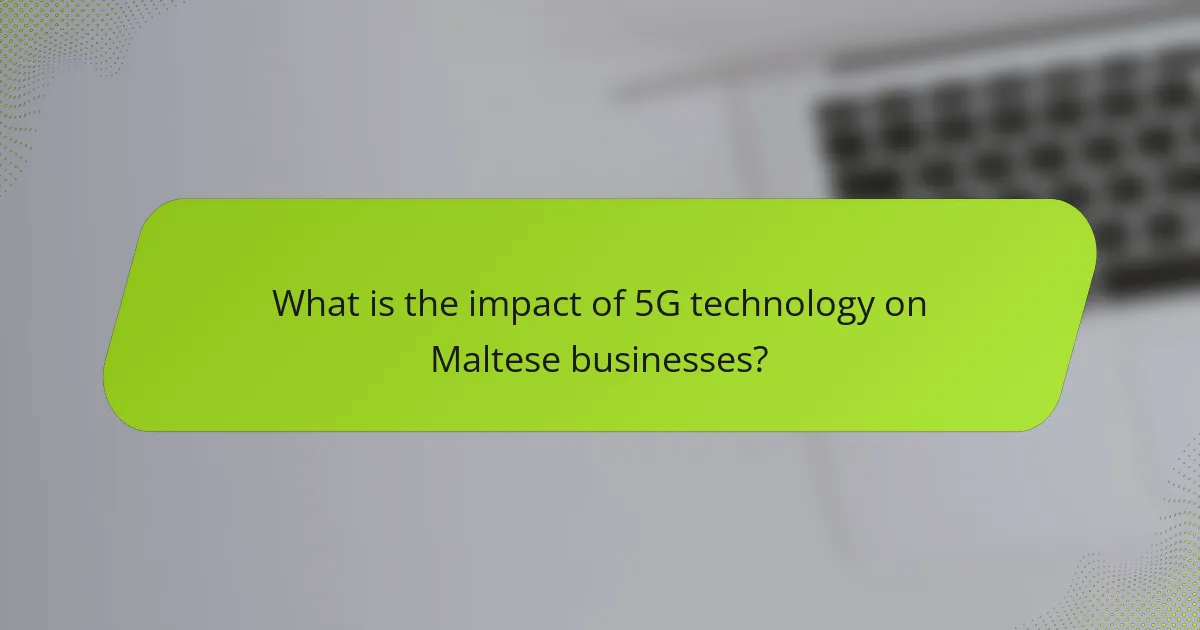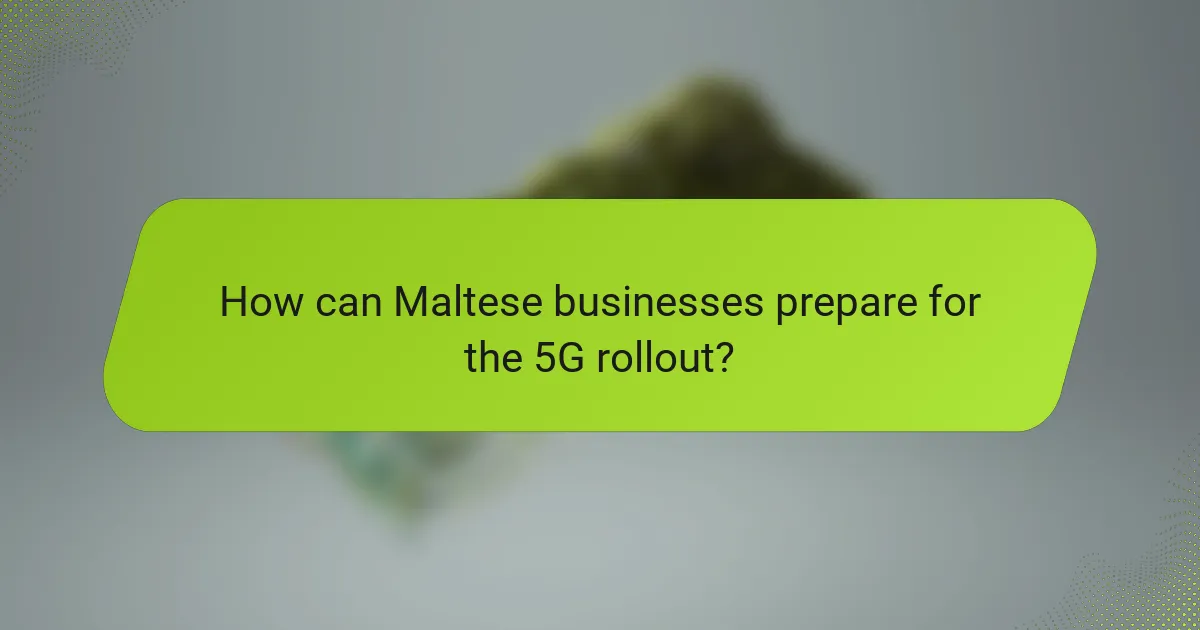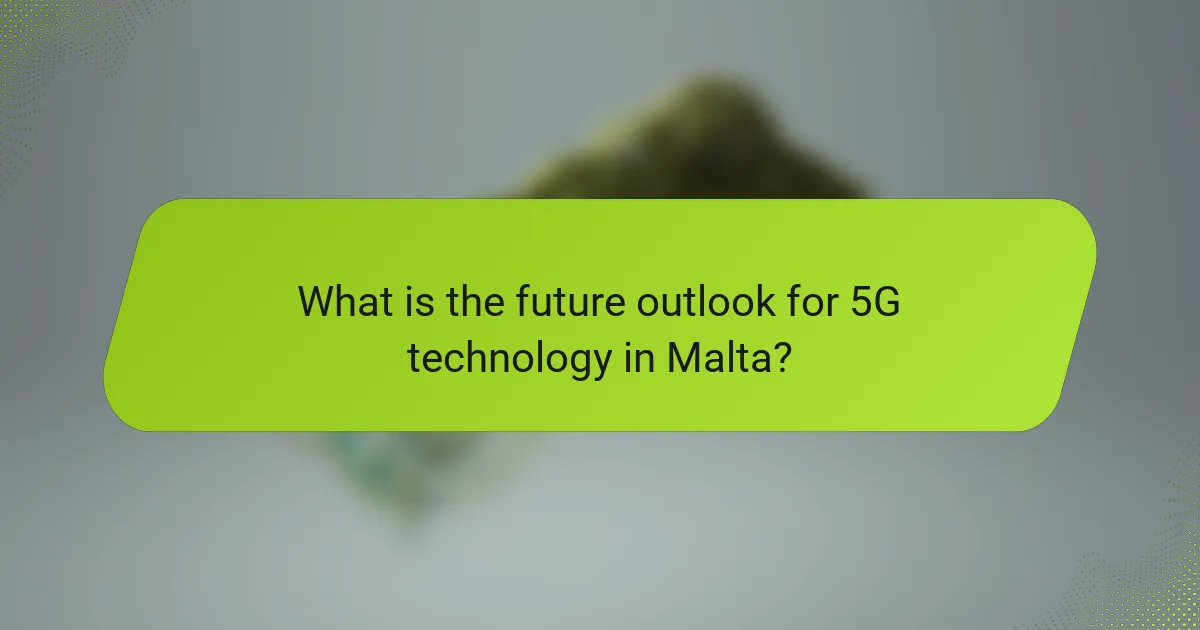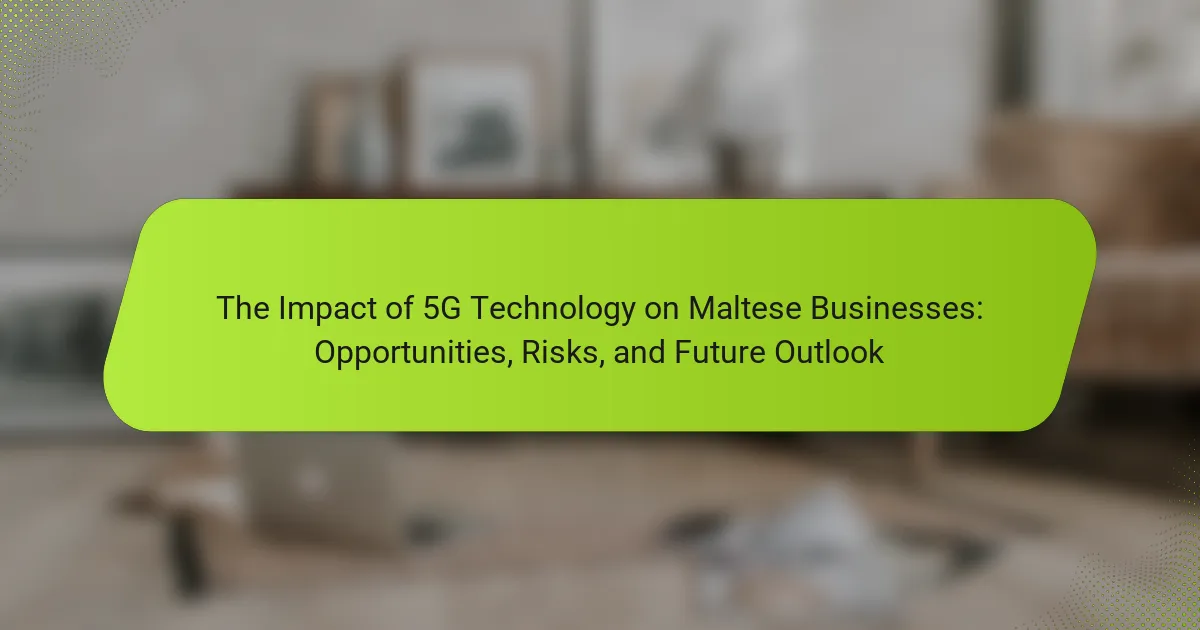
What is the impact of 5G technology on Maltese businesses?
5G technology significantly enhances Maltese businesses by improving connectivity and enabling faster data transfer. This technology facilitates real-time communication, which is crucial for sectors like healthcare and logistics. Maltese companies can leverage 5G for advanced applications such as IoT and smart city initiatives. According to a report by the Malta Communications Authority, 5G can boost economic growth by increasing productivity and efficiency. Enhanced mobile broadband will allow businesses to operate more effectively and innovate new services. The adoption of 5G is expected to create new job opportunities and attract foreign investment. Overall, 5G technology presents both opportunities and challenges for Maltese businesses.
How does 5G technology differ from previous generations?
5G technology differs from previous generations primarily in its speed, capacity, and latency. It offers download speeds up to 10 Gbps, significantly faster than 4G’s maximum of 1 Gbps. 5G supports a higher number of connected devices per square kilometer, allowing up to 1 million devices compared to 4G’s 100,000. The latency in 5G networks is as low as 1 millisecond, while 4G typically has a latency of around 30-50 milliseconds. This reduction in latency enhances real-time communication and responsiveness. Additionally, 5G utilizes advanced technologies like Massive MIMO and beamforming, which improve signal quality and efficiency. These advancements enable new applications such as augmented reality, smart cities, and autonomous vehicles.
What are the key features of 5G technology?
5G technology offers enhanced speed, low latency, and increased capacity. It provides download speeds up to 10 Gbps, significantly faster than 4G. The latency is reduced to as low as 1 millisecond, enabling real-time communication. 5G supports a higher number of connected devices, up to 1 million devices per square kilometer. It also enables advanced applications like IoT and smart cities. The technology operates on higher frequency bands, allowing for more data transmission. 5G networks are designed for energy efficiency, improving battery life for connected devices. These features collectively transform connectivity and open new business opportunities.
How does 5G enhance connectivity for businesses?
5G enhances connectivity for businesses by providing faster data transfer speeds and lower latency. This technology allows for real-time communication and collaboration. Businesses can transmit large files quickly, improving efficiency. 5G supports a higher number of connected devices simultaneously. This is crucial for IoT applications in smart cities and industries. According to a report by Ericsson, 5G can deliver speeds up to 10 Gbps. This capability allows businesses to innovate and implement advanced technologies. Enhanced connectivity leads to improved customer experiences and streamlined operations.
What opportunities does 5G technology present for Maltese businesses?
5G technology presents significant opportunities for Maltese businesses. It enables faster internet speeds and lower latency. This can enhance customer experiences through improved services. Businesses can leverage 5G for real-time data analytics. This leads to better decision-making and operational efficiency. Additionally, 5G supports the Internet of Things (IoT). This allows for smarter operations and automation in various sectors. Enhanced connectivity can attract foreign investments to Malta. Overall, 5G technology can drive innovation and competitiveness in the Maltese market.
Which sectors in Malta are likely to benefit the most from 5G?
The sectors in Malta likely to benefit the most from 5G include healthcare, tourism, and manufacturing. Healthcare can leverage 5G for telemedicine and remote monitoring, enhancing patient care. The tourism sector can utilize 5G for improved connectivity and augmented reality experiences, attracting more visitors. Manufacturing can benefit from increased automation and real-time data analytics, optimizing production processes. These sectors will experience significant advancements due to faster data transfer and lower latency provided by 5G technology.
How can 5G technology drive innovation in Maltese industries?
5G technology can drive innovation in Maltese industries by enabling faster data transmission and enhancing connectivity. This increased speed allows businesses to implement real-time data analytics. Industries such as healthcare can leverage 5G for telemedicine applications. Manufacturing can benefit from improved automation and IoT integration. Enhanced connectivity supports remote work and collaboration across various sectors. The tourism industry can utilize 5G for augmented reality experiences. According to the European Commission, 5G can boost the EU economy by €113 billion annually. This potential for economic growth underscores the transformative impact of 5G on Maltese industries.
What are the potential risks associated with 5G technology for Maltese businesses?
Potential risks associated with 5G technology for Maltese businesses include cybersecurity threats, increased operational costs, and regulatory challenges. Cybersecurity threats arise due to the heightened connectivity of devices, making networks more vulnerable to attacks. Increased operational costs can stem from the need for infrastructure upgrades and maintenance. Regulatory challenges may involve compliance with new laws and standards that govern 5G deployment. These risks can impact business continuity and overall operational efficiency. Studies indicate that businesses adopting 5G must invest in robust security measures to mitigate these risks effectively.
What cybersecurity concerns arise with the adoption of 5G?
The adoption of 5G technology raises significant cybersecurity concerns. Increased connectivity can lead to a larger attack surface for cybercriminals. The speed and volume of data transmission may overwhelm existing security protocols. Many devices connected to 5G networks may lack adequate security measures. This can expose sensitive data to unauthorized access. Additionally, the complexity of 5G infrastructure can create vulnerabilities. The reliance on software-defined networks increases the risk of software-based attacks. According to a report by the European Union Agency for Cybersecurity, 5G networks are more susceptible to certain types of cyber threats compared to previous generations.
How might 5G implementation affect business operations in Malta?
5G implementation will significantly enhance business operations in Malta. It will provide faster internet speeds, improving data transfer rates. This technology enables real-time communication and collaboration. Businesses can leverage IoT devices more effectively with 5G’s low latency. Enhanced connectivity will attract foreign investment and foster innovation. According to a report by the European Commission, 5G can boost the EU economy by €113 billion annually. In Malta, this could lead to increased productivity across various sectors. Overall, 5G will transform the operational landscape for Maltese businesses.

How can Maltese businesses prepare for the 5G rollout?
Maltese businesses can prepare for the 5G rollout by upgrading their infrastructure. This includes investing in compatible hardware and software. Businesses should also train employees on new technologies enabled by 5G. Developing partnerships with telecom providers can enhance access to resources. Conducting a thorough assessment of current systems is essential. This helps identify areas that need improvement for 5G integration. Staying informed about 5G developments will aid in strategic planning. Engaging in pilot projects can provide practical insights into 5G applications. These steps will position Maltese businesses to leverage the benefits of 5G effectively.
What strategies should businesses adopt to leverage 5G technology?
Businesses should adopt strategies that focus on enhancing connectivity and innovation to leverage 5G technology. First, they should invest in infrastructure upgrades to support high-speed connectivity. This includes acquiring 5G-compatible devices and enhancing network capabilities.
Next, businesses can explore new applications of 5G, such as IoT integration for improved operational efficiency. Implementing smart devices can lead to real-time data analysis and better decision-making.
Additionally, companies should prioritize cybersecurity measures to protect sensitive data transmitted over 5G networks. With increased connectivity, the risk of cyber threats also rises.
Training employees to adapt to new technologies is crucial for maximizing the benefits of 5G. A skilled workforce can better utilize advanced tools and applications.
Lastly, businesses should collaborate with tech partners to stay updated on emerging 5G solutions. Partnerships can foster innovation and drive competitive advantage in the market.
What investments are necessary for a successful transition to 5G?
Investment in infrastructure upgrades is necessary for a successful transition to 5G. This includes the deployment of new cell towers and small cells to enhance coverage. Additionally, investment in fiber optic networks is critical for backhaul connectivity. Upgrading existing network equipment to support 5G standards is also essential. Companies must invest in advanced technologies such as network slicing and edge computing. Training personnel to manage and maintain new 5G systems is another key investment. Lastly, acquiring spectrum licenses is vital for operating 5G networks. These investments collectively enable efficient and effective 5G deployment.
How can businesses ensure they are ready for 5G integration?
Businesses can ensure they are ready for 5G integration by evaluating their current infrastructure. They should assess network capabilities and upgrade where necessary. Investing in compatible hardware is crucial for seamless integration. Training staff on 5G technology enhances operational efficiency. Collaborating with telecom providers can facilitate smoother transitions. Conducting pilot projects allows businesses to test 5G applications. Research indicates that 5G can increase data speeds by up to 100 times compared to 4G. This potential for improved performance validates the need for readiness.
What role do government policies play in the adoption of 5G?
Government policies significantly influence the adoption of 5G technology. They establish regulatory frameworks that facilitate infrastructure development. For instance, policies can streamline the permitting process for tower installations. This reduces delays and costs associated with deploying 5G networks.
Additionally, government investments in research and development support technological advancements. Countries that allocate funds for 5G initiatives see faster rollouts. Furthermore, policies promoting competition among telecom providers enhance service quality and pricing.
In Malta, the government has initiated strategies to encourage 5G deployment. These actions include public-private partnerships and funding for innovation. Overall, effective government policies are essential for the successful integration of 5G technology.
How can government support Maltese businesses in embracing 5G?
The government can support Maltese businesses in embracing 5G by providing financial incentives and grants. These financial aids can help offset the costs of infrastructure upgrades. Additionally, the government can facilitate partnerships between telecom providers and businesses. This collaboration can ensure better access to 5G technology. Training programs for employees on 5G applications can also be implemented. Such programs will enhance the workforce’s skills in utilizing new technology. Furthermore, the government can promote awareness campaigns about the benefits of 5G. Increased public understanding can drive adoption among businesses. Lastly, regulatory frameworks should be established to support innovation in 5G services. These measures can create a conducive environment for business growth in the 5G era.
What regulatory challenges might businesses face with 5G?
Businesses may face several regulatory challenges with 5G. These challenges include spectrum allocation issues, as regulatory bodies must manage frequencies for 5G networks. Compliance with data protection laws is critical, especially with increased data transmission. Infrastructure deployment regulations can also pose hurdles, as permits may be required for new towers. Environmental regulations may affect site selection for infrastructure. Additionally, cybersecurity regulations will need to be adhered to, given the increased vulnerabilities in 5G networks. Lastly, international regulations may complicate cross-border data flows and operations. These factors collectively create a complex regulatory landscape for businesses adopting 5G technology.

What is the future outlook for 5G technology in Malta?
The future outlook for 5G technology in Malta is promising. The Maltese government has prioritized the rollout of 5G infrastructure. This initiative aims to enhance connectivity across the island. Increased internet speeds and lower latency are expected benefits. Businesses in Malta will likely see improved operational efficiency. Sectors such as healthcare, manufacturing, and tourism stand to gain significantly. Studies indicate that 5G can drive economic growth by enabling innovation. Malta’s strategic location in the Mediterranean enhances its potential as a tech hub. Overall, 5G technology is poised to transform the Maltese business landscape.
How will 5G technology shape the Maltese business landscape in the coming years?
5G technology will significantly transform the Maltese business landscape by enhancing connectivity and enabling new applications. The increased data speeds and lower latency will facilitate real-time communication. This improvement will benefit sectors such as healthcare, manufacturing, and tourism. Businesses will adopt IoT devices more widely, leading to smarter operations. Enhanced mobile broadband will support remote work and digital services. According to the Malta Communications Authority, 5G could boost the economy by improving productivity. Additionally, it will attract foreign investment in technology-driven sectors. Overall, 5G will drive innovation and competitiveness in Malta’s business environment.
What trends are emerging with the adoption of 5G in Malta?
Emerging trends with the adoption of 5G in Malta include increased connectivity and enhanced mobile broadband. Businesses are leveraging 5G for faster data transmission and improved operational efficiency. The technology supports the growth of IoT applications in various sectors, such as healthcare and manufacturing. There is also a shift towards remote working solutions enabled by 5G capabilities. Additionally, Maltese telecom companies are investing in infrastructure to support widespread 5G access. According to the Malta Communications Authority, 5G adoption is expected to boost economic growth by improving service delivery.
How can businesses stay competitive in a 5G-enabled market?
Businesses can stay competitive in a 5G-enabled market by leveraging enhanced connectivity and speed. This technology allows for real-time data processing and improved customer experiences. Companies should invest in 5G infrastructure to optimize operations and reduce latency. Utilizing IoT devices can streamline processes and increase efficiency. Data analytics can inform decision-making and drive innovation. Collaborating with technology partners can enhance capabilities and access new markets. Adapting business models to embrace digital transformation is essential. Continuous training for employees on 5G applications will maintain a skilled workforce. These strategies will help businesses thrive in a rapidly evolving environment.
What best practices should Maltese businesses follow when implementing 5G technology?
Maltese businesses should conduct thorough assessments of their existing infrastructure before implementing 5G technology. This includes evaluating current network capabilities and identifying necessary upgrades. Training staff on 5G technology is essential for maximizing its benefits. Employees need to understand how to leverage 5G for improved operations.
Collaboration with telecommunications providers is crucial. Businesses should work closely with providers to ensure optimal network performance. Implementing robust cybersecurity measures is vital due to increased connectivity risks. This includes regular updates and monitoring of security protocols.
Adopting a phased approach to implementation allows businesses to manage the transition effectively. This strategy minimizes disruptions and enables adjustments based on initial results. Continuous evaluation of 5G’s impact on business operations will help in refining strategies. Regular feedback from users can guide improvements and adaptations.
Staying informed about regulatory changes related to 5G is necessary. Compliance with local laws will prevent legal issues and promote smooth operations. Engaging with industry peers and participating in forums can provide valuable insights into best practices. These steps will help Maltese businesses harness the full potential of 5G technology.
What common challenges should businesses anticipate during 5G adoption?
Businesses should anticipate several common challenges during 5G adoption. These challenges include high infrastructure costs, which can strain budgets. Additionally, businesses may face a lack of skilled workforce to manage 5G technology. Compatibility issues with existing systems can also arise, complicating integration efforts. Security concerns are heightened with increased connectivity, making data protection crucial. Regulatory hurdles may delay implementation, as compliance with new standards is necessary. Lastly, businesses might experience customer adaptation challenges, as users need time to adjust to new technology. Each of these factors can significantly impact the speed and success of 5G adoption.
How can businesses maximize the benefits of 5G technology?
Businesses can maximize the benefits of 5G technology by leveraging its high-speed connectivity and low latency. This enables faster data transfer and improved real-time communication. Companies should invest in 5G infrastructure to support advanced applications. Implementing IoT devices can enhance operational efficiency and data collection. Additionally, businesses can utilize cloud services for better resource management. Training staff on 5G capabilities ensures effective utilization. Collaborating with tech partners can drive innovation and integration. According to a report by the GSMA, 5G could contribute $2.2 trillion to the global economy by 2030, highlighting its potential impact.
The main entity of this article is 5G technology and its impact on Maltese businesses. The article explores how 5G enhances connectivity, improves operational efficiency, and drives innovation across various sectors such as healthcare, tourism, and manufacturing. It outlines the key features of 5G, including increased speed, lower latency, and support for IoT applications, while also addressing potential risks such as cybersecurity threats and regulatory challenges. Additionally, the article discusses strategies for businesses to prepare for 5G integration and highlights the future outlook for 5G technology in Malta, emphasizing its potential to boost economic growth and attract foreign investment.
